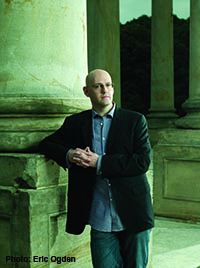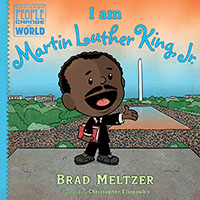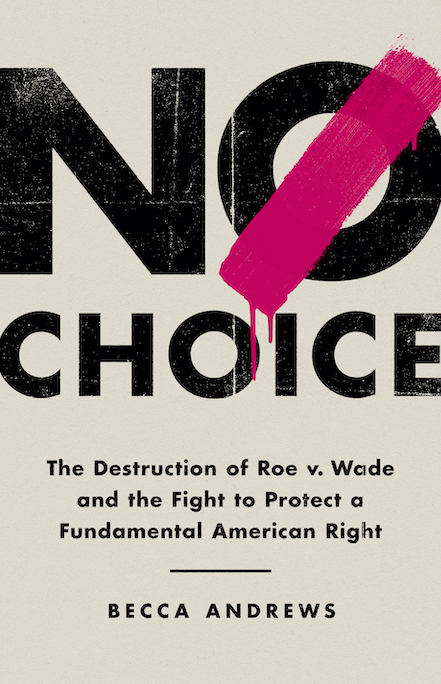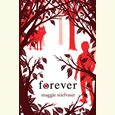Celebrating American Heroes
Brad Meltzer talks with Chapter 16 about his new children’s biography of Martin Luther King Jr.
New York Times bestselling author Brad Meltzer has penned political thrillers for adults, written nonfiction books for parents to share with their children, created critically-acclaimed comic books, and developed history programs for television, including Brad Meltzer’s Lost History. Early last year, he launched a children’s book series called Ordinary People Change the World, illustrated by Christopher Eliopoulos. The newest book, I Am Martin Luther King, Jr., takes a look at the man whose life was cut way too short in Memphis.
 Chapter 16 talked with Meltzer via email about this biography series, one he hopes will inspire children to dream big, and what it was like to take on the life of King in a slim book for children.
Chapter 16 talked with Meltzer via email about this biography series, one he hopes will inspire children to dream big, and what it was like to take on the life of King in a slim book for children.
Chapter 16: This is one of a handful of books in the Ordinary People Change the World series for Dial. Can you talk about your decision to create this series?
Brad Meltzer: A few years back, I was looking for clothing for my daughter, and all I could find were shirts with princesses on them. And I thought, as someone who’s around so much history, There are so many better heroes I can give her. So I asked a friend to draw me a cartoon picture of Amelia Earhart. I wrote the words “I Am Amelia Earhart” on it—and on the back I wrote, “I know no bounds.” My daughter loved it. Then my wife wanted one. And her friends wanted one. And the more I told her about Amelia Earhart, the more she fell in love. It made me realize: once our kids hear about these real American heroes, they react the same way we all do. They’re inspired. They dream bigger. They work harder. Right there, these books were born.
Chapter 16: Do you consider these books biographical nonfiction or more of a blend of inspirational fiction and facts?
Meltzer: We’re not making this up. Abraham Lincoln didn’t have a beard at the age of eight, and sometimes we make jokes in the word balloons (like Lincoln saying, “I’m going to be on the penny one day”). But the text and the stories are real. It can be read as a true biography for kids.
 Chapter 16: When you wrote the first book in the series last year, what was it like to go from writing adult thrillers and comics to picture books? Did anything surprise you about the picture-book-writing process?
Chapter 16: When you wrote the first book in the series last year, what was it like to go from writing adult thrillers and comics to picture books? Did anything surprise you about the picture-book-writing process?
Meltzer: As someone raised on comic books, the tradition was pretty natural. Sure, I don’t kill people like I do in my thrillers. But at the end of the day, a good story is a good story. The one thing you have to learn is: you have to shut up. Let the artist do their magic.
Chapter 16: Can you talk about your research on Martin Luther King Jr. for this particular book?
Meltzer: This was, without question, the hardest book to write. Dr. King was just involved in so many parts of the amazingly complex civil-rights movement. People think he gave a big speech and all was perfect. But that was just the midpoint. There was Selma and so much more—and so much more before all that. I wanted it all in there. Plus, I had to write in his voice. Nothing was more intimidating.
Chapter 16: What challenges, if any, were there in making his story accessible to young readers?
Meltzer: Kids aren’t stupid. All you have to do is tell the story and get out of the way. They understand it. I think honesty is really best in complex situations.
Chapter 16: Both Representative John Lewis and Michele Norris read early drafts of the book. Did they give any feedback that contributed to the story’s content and/or flow?
Meltzer: When I’m writing about presidents in my thrillers, I reach out to presidents. When I write about the military, I reach out to military leaders. Here, I wanted to convey all the complexity of race, power, and life in the civil-rights movement. You better believe I wanted the best help I could get. Most important, they were there to show me my own blind spots and what I might be missing.
Chapter 16: Can you talk about working with illustrator Christopher Eliopoulos? What does he bring to this series with his art?
Meltzer: I know Chris’s work from comics, but the reason I was so insistent about working with him was he can do that Calvin and Hobbes / Peanuts thing where the characters aren’t just funny—they’re lovable. You dream with them, fail with them, and smile with them. It’s so much harder than you think. Chris’s superpower is just that: love.
Chapter 16: What’s next for you?
Meltzer: I Am George Washington. And then…. You’ll see.

Julie Danielson, a former school librarian, blogs at Seven Impossible Things Before Breakfast and writes about picture books for Kirkus Reviews and BookPage. Her first book, Wild Things! Acts of Mischief in Children’s Literature, was released last year.





